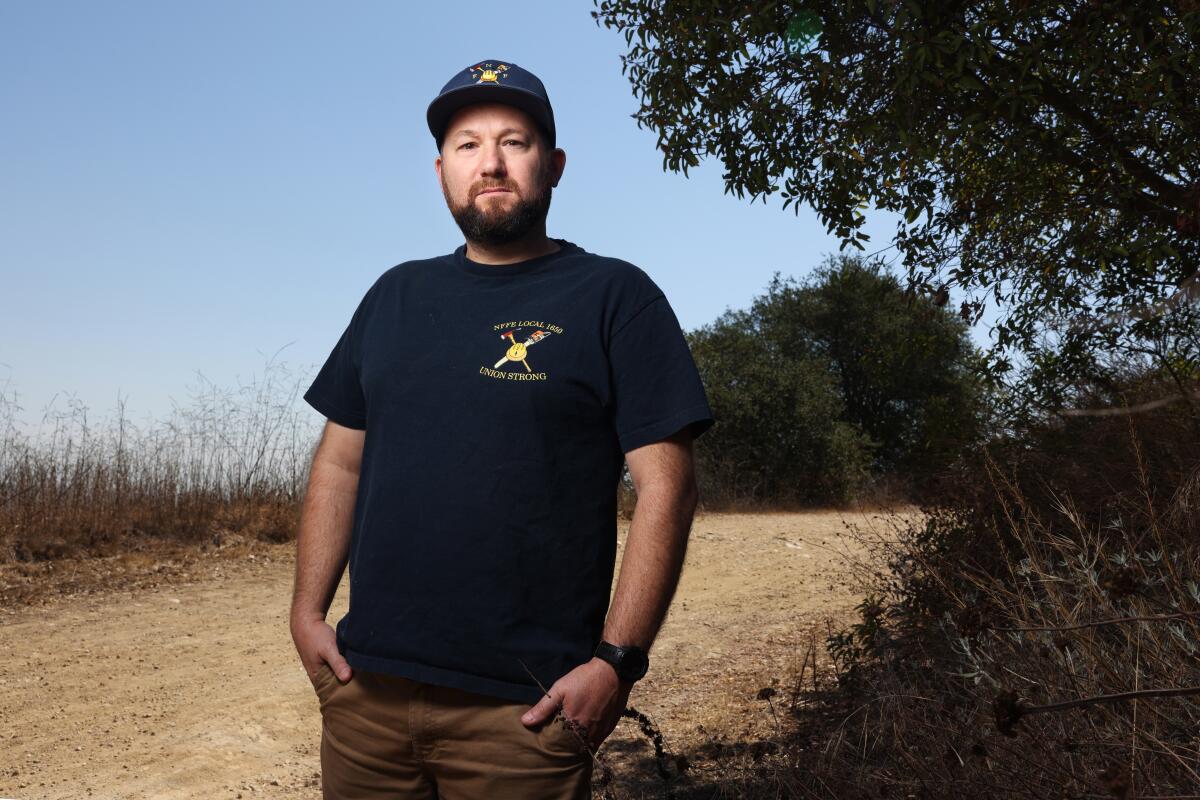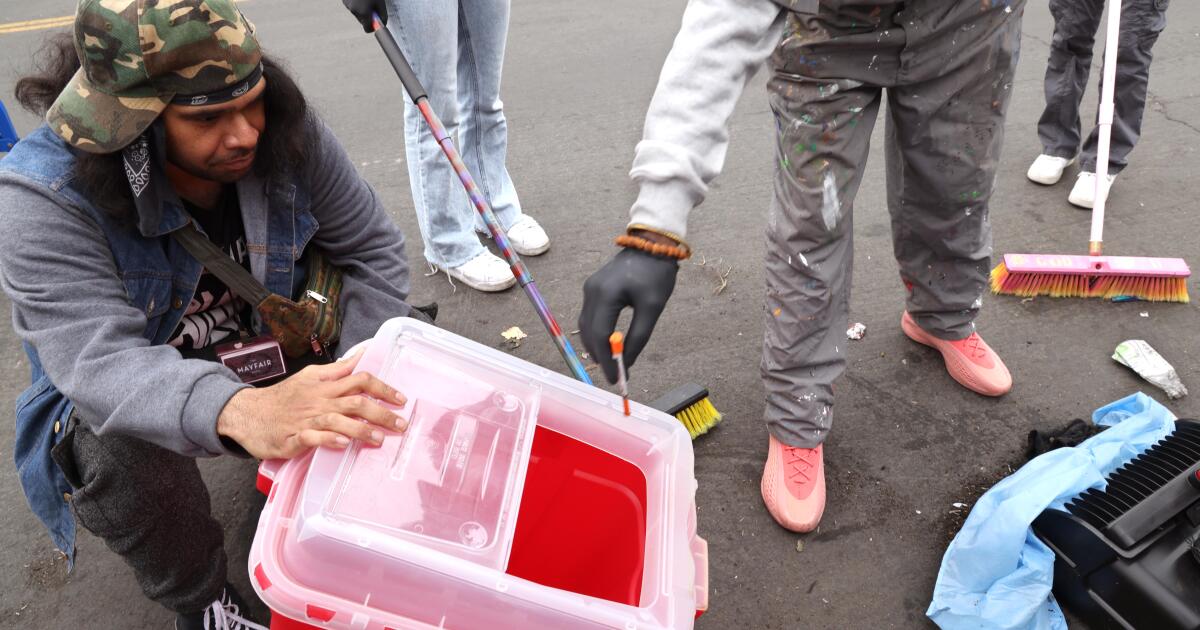Worried staffers unionize at Yosemite, Sequoia national parks
For two years, labor organizers tried to unionize employees at a trio of celebrated California national parks, but they couldn’t reach critical mass.
Then came mass firings of National Park Service employees in February under the Trump administration. Many employees were reinstated, but litigation concerning the legality of the firings winds on. The park service has lost about a quarter of its staff since Trump reclaimed the White House, and that’s on top of a proposed $1-billion budget cut to the agency.
This summer the scales tipped. More than 97% of employees at Yosemite and Sequoia and Kings Canyon national parks who cast ballots voted to unionize, with results certified last week. More than 600 staffers — including interpretive park rangers, biologists, firefighters and fee collectors — are now represented by the National Federation of Federal Employees.
Steven Gutierrez, national business representative with the National Federation of Federal Employees, said it took mass firings to “wake people up.”
(Christina House / Los Angeles Times)
“Culture is hard to change,” said Steven Gutierrez, a national business representative for the union. “It takes something like this administration firing people to wake people up, to say, ‘Hey, I’m vulnerable here and I need to invest in my career.’”
The unionized employees work at some of California’s most celebrated and highly visited national parks. Yosemite is famous for its awe-inspiring valley, while Sequoia and Kings Canyon are known for their giant sequoia trees.
Amid that beauty is a workforce that is frustrated and fearful. Two employees at Yosemite National Park described rock-bottom morale amid recent turmoil — and a sense that the union could provide an avenue for change. Both are union representatives and requested anonymity for fear of retaliation.
“With this administration, I think there’s a lot more people who are scared, and I think the union definitely helps towards protections that we really want,” said one employee.
National Park Service Ranger Anna Nicks walks through a grove of sequoia trees in Sequoia National Park in May 2024.
(Genaro Molina / Los Angeles Times)
Despite staff being depleted by buyouts and a hiring freeze, Interior Secretary Doug Burgum has ordered parks to remain “open and accessible.” As a result, the employee said visitors may not notice something is off.
“There’s a lot of folks doing multiple jobs and just trying to hold up the park,” she said, adding that she believes that the union will help ensure people get paid properly for the work they do and that their duties don’t shift.
The employees stressed that many workplace problems they want to see fixed — including low pay and squalid living conditions — predate Trump’s second stint in the White House. But recent developments have exacerbated the situation.
Because pay hasn’t kept pace with inflation, one employee said he’s unable to pay rent and lives out of his car for most of the year. Meanwhile, he said, those in park housing face safety threats such as hantavirus-carrying rodents that invade living spaces, caving-in roofs and unstable decks. Understaffing has plagued Yosemite for years.
“People that you see working here, they’re really at their wit’s end,” he said. “Personally speaking, it’s just a lot of work to handle. Years ago, we had twice as many people doing this work.”
Staffers are “worried about their futures,” he added.
The National Park Service did not respond to a request for comment. But in a statement to a Senate appropriations subcommittee in May, Burgum said the Trump administration remains committed to supporting the parks, while looking for ways to cut costs.
A waterfall is reflected in water in the meadow in the Yosemite Valley as the snowpack melts in April 2023.
(Francine Orr / Los Angeles Times)
“Since becoming Interior Secretary, I’ve traveled to National Parks, historic sites, and wildlife refuges to learn and hear from leadership on the ground,” Burgum said. “We’re instituting changes to get more people actually working in the parks and are looking forward to what Yellowstone Superintendent Cam Sholly forecasted to be an ‘outstanding summer.’ ”
The unionization vote comes as the Trump administration seeks to strip federal employees of labor protections many have long enjoyed. On Thursday, Trump signed an executive order that directs certain federal agencies — including NASA, the National Weather Service and the Bureau of Reclamation — to end collective bargaining agreements with unions representing federal employees.
The Department of Veterans Affairs previously moved to terminate protections for more than 400,000 of its workers. The president’s overall effort on this front is being fought in court, although federal judges have so far sided with the administration.
As labor unrest mounts, Americans and foreign tourists are visiting national parks like never before. In 2024, there were a record 332 million visits to national parks, including 4 million to Yosemite. Crowds continued to stream into national parks over Labor Day weekend.
Groups that advocate for public lands say that short staffing is quietly adding to long-standing problems.
Preventative Search and Rescue Program Coordinator Anna Marini gives the Lutter family children junior guide books after they finished a hike in August 2024 in Joshua Tree National Park.
(Gina Ferazzi / Los Angeles Times)
“It’s clear staffing shortages are directly impacting park operations across the system,” the nonprofit National Parks Conservation Assn. said in a statement Wednesday.
“Parks like Joshua Tree and Yosemite are struggling with search and rescue, law enforcement and even basic medical services, while some parks have no maintenance staff at all. Seasonal roads, trails and campgrounds like those at Sequoia and Kings Canyon remain closed due to unaddressed damage.”
The union voting took place July 22 to Aug. 19, and included permanent and seasonal employees. The National Federation of Federal Employees represents workers at several other national parks, including Yellowstone and, in Ohio, Cuyahoga Valley, as well as those in the U.S. Forest Service and Bureau of Land Management.
A union sign hailing federal workers is displayed at Sequoia National Park.
(Steven Gutierrez)
Federal employees don’t have the right to strike, Gutierrez said, meaning that much of employees’ advocacy has to happen in Washington, D.C. He said the union can bring workers face to face with congressional leaders to explain why their jobs matter — including the tourism dollars they help generate.
Next steps will include hammering out labor contracts for Yosemite and Sequoia and Kings Canyon, which can provide job protections.
Gutierrez said he’d like to see one drafted by December but acknowledged that it can be a long process.
“If Trump puts his fingers into it, it’s going to take longer,” he said.

